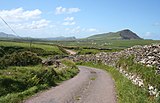Dingle Way
| Dingle Way | |
|---|---|
 Section of the Dingle Way near Smerwick Harbour and Ballydavid Head | |
| Length | 162 km (101 mi)[1] |
| Location | County Kerry, Ireland |
| Designation | National Waymarked Trail[1] |
| Trailheads | Tralee[1] |
| Use | Hiking |
| Elevation | |
| Elevation gain/loss | +2,590 m (8,497 ft)[1] |
| Highest point | Shoulder of Mount Brandon (640 m (2,100 ft))[2] |
| Hiking details | |
| Trail difficulty | Strenuous[1] |
| Season | Any |
| Sights | Dingle Peninsula |
| Surface | Mountain, field and cliff paths; roads; beaches[1] |
| Website | www.thedingleway.ie |
| Map overview | |
 | |
The Dingle Way (Irish: Slí Chorca Dhuibhne)[3] is a long-distance trail around the Dingle Peninsula in County Kerry, Ireland. It is a 162-kilometre (101-mile) long circular route that begins and ends in Tralee and is typically completed in eight days.[4] It is designated as a National Waymarked Trail by the National Trails Office of the Irish Sports Council and is managed by the Dingle Way Committee and Kerry County Council.[5]
Route[]
The trail begins in Tralee, following the towpath of the Tralee Ship Canal to Blennerville, after which it follows the road for a while before climbing up to a mountain track along the northern flanks of the Slieve Mish Mountains. From here it descends towards Tralee Bay and the village of Camp.[6] The next few stages – Camp to Annascaul, via Inch Strand; Annascaul to Dingle, via Lispole; and Dingle to Dunquin, via Ventry – mainly follow minor roads and boreens.[7] The latter section of the stage between Dingle and Dunquin follows a cliff path around Slea Head.[8] The section between Dunquin and Ballycurrane follows a mixture of roads, beaches and cliff paths.[9] The most mountainous stretch of the Way now follows as the trail ascends a saddle between Brandon and Masatiompan mountains.[10] At 640 metres (2,100 feet), this is the highest point reached by any of the National Waymarked Trails in Ireland.[11] The Way then descends to Brandon village and follows a trail to the village of Cloghane.[12] From Cloghane, the trail follows Fermoyle Strand, Ireland's longest beach, to Fahamore, before following roads to the village of Castlegregory.[13] The final stage follows the coastline to Camp before retracing the outward route to Tralee.[14]
Usage[]
A review of the National Waymarked Trails in 2010 found both multi-day and day usage of the Dingle Way to be high and recommended that work should commence to upgrade it to a National Long Distance Trail, a proposed new standard of trail in Ireland intended to meet international standards for outstanding trails. It also recommended that the development of looped walks off the main route should be considered.[5]

The old ship canal between Tralee and Blennerville

Tarmac road section, looking towards Ballydavid Head

Cliffs near Slea Head

Hillside pasture and residence
References[]
Notes[]
- ^ a b c d e f "Dingle Way". IrishTrails. Irish Sports Council. Retrieved 1 August 2011.
- ^ Fewer 1996, p. 1.
- ^ Bardwell & Megarry 2009, p. 1.
- ^ Bardwell & Megarry 2009, p. 10.
- ^ a b National Trails Office 2010, p. 34.
- ^ Fewer 1996, pp. 98–100.
- ^ Bardwell & Megarry 2009, pp. 34, 37, 41.
- ^ Fewer 1996, p. 107.
- ^ Fewer 1996, p. 111.
- ^ Fewer 1996, p. 115.
- ^ "Guide to the National Waymarked Ways of Ireland". IrishTrails. Irish Sports Council. Archived from the original on 3 February 2011. Retrieved 1 August 2011.
- ^ Bardwell & Megarry 2009, p. 52.
- ^ Bardwell & Megarry 2009, pp. 53–55.
- ^ Fewer 1996, p. 121.
Bibliography[]
- Bardwell, Sandra; Megarry, Jacquetta (2009). The Dingle Way (2nd ed.). Dunblane: Rucksack Readers. ISBN 978-1-898481-33-1.
- Fewer, Michael (1996). The Way-marked Trails of Ireland. Dublin: Gill & Macmillan. ISBN 0-7171-2386-3.
- National Trails Office (2010). "Setting New Directions. A review of National Waymarked Ways in Ireland" (PDF). Dublin: Irish Sports Council. Archived from the original (pdf) on 31 May 2011.
External links[]
| Wikimedia Commons has media related to Dingle Way. |
- Long-distance trails in the Republic of Ireland
- Geography of County Kerry
- Tourist attractions in County Kerry






